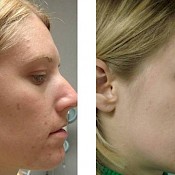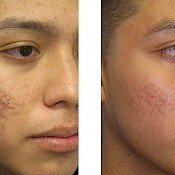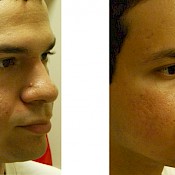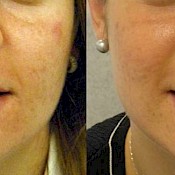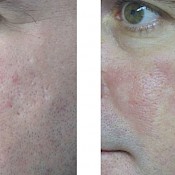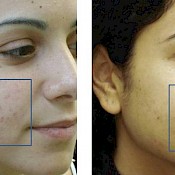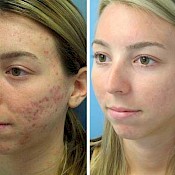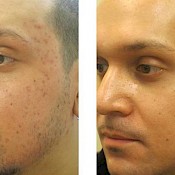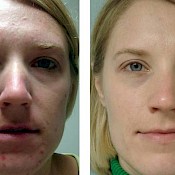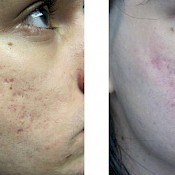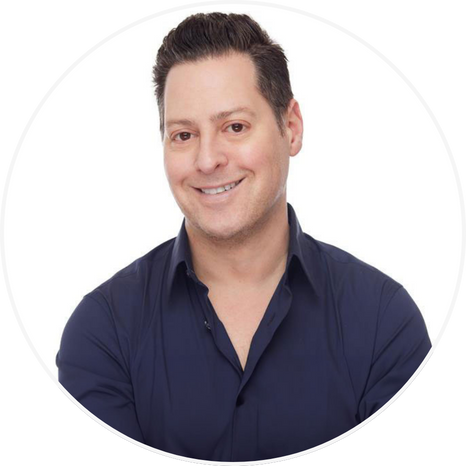Acne Treatment
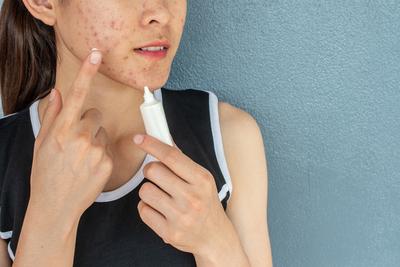
Acne, affecting adolescents and adults, is a common dermatology concern. Many solutions exist for uncomfortable whiteheads, blackheads, cysts, and pimples, making managing your unique acne symptoms possible. At Schweiger Dermatology Group, our expert team provides advanced solutions for all types of acne.
What Is Acne?
Acne is a skin condition when hair follicles get clogged with dead skin cells or oil, creating the right environment for bacteria to thrive. People who get acne tend to experience it in specific areas around the body, such as the upper back, shoulders, chest, forehead, and around the face. Severity ranges from mild to severe, causing physical discomfort and emotional distress as the level increases.
Types of Acne
Several types of acne can occur, each with its symptoms and causes. Understanding your acne type allows for targeted care, which can help minimize scarring. The most common kinds of acne include:
- Comedonal acne: This type of acne occurs with blackheads and whiteheads due to clogged follicles.
- Hormonal acne: This type of acne occurs when there is an overproduction of sebum that blocks the pores, often resulting in lower face cysts or pimples that worsen during cycles
- Cystic acne: This type of acne causes deep, sometimes painful, pus-filled pimples. These can leave scars on the skin.
- Fungal acne: This type of acne happens when yeast gets into the hair follicles. Fungal acne may become inflamed and itchy.
- Nodular acne: This type of acne causes pimples deep beneath the skin that can last for long periods of time.
Adult Acne vs Teen Acne
Teen acne is a common skin condition, largely due to puberty. Around 85% of teens have acne during that time of their lives. Teen acne is caused by bacteria called C. acnes and increased hormones that lead to extra sebum production and clogged pores. Teen acne is commonly treated with medicated face washes, but it can sometimes be treated with topical or oral medications when it’s moderate or severe.
Adult acne is a chronic condition that can negatively impact the quality of adult patients’ lives. It usually falls into one of two subtypes: persistent and late-onset. Persistent adult acne is teen acne that has either never resolved or returned from the teen years. Late-onset acne occurs after 25. Acne treatment for adults can include anything from medications to laser therapies.
What Causes Acne?
Acne can have several causes. While the primary culprit is excess oil production, many other factors can increase the likelihood of acne and its severity, including:
- Hormonal changes: Fluctuations in androgens can increase excess oil production in the skin. This mainly occurs during puberty, menstruation, pregnancy, and menopause, leading to more frequent acne breakouts during those periods.
- Genetics: Your genetic makeup can influence your skin’s sensitivity to hormones, oil production, and the rate of skin cell turnover. If your parents had acne, you’re more likely to develop it, too.
- Diet: While the link between diet and acne is still being researched, some studies suggest that high-glycemic foods and dairy products can make acne worse in some individuals.
- Medications: Certain medications, such as corticosteroids, androgens, lithium, and some birth control pills, can trigger or worsen acne as a side effect. Always consult with your healthcare provider about potential cosmetic skin-related side effects.
- Greasy cosmetics: Oil-based makeup, sunscreens, and hair products can clog pores similar to your skin’s natural overproduction, leading to acne breakouts.
- Stress: While stress doesn’t directly cause acne, it can exacerbate existing acne by triggering the release of stress hormones like cortisol. These hormones can increase inflammation and oil production in the skin.
Dermatologist Acne Treatment Options
You don’t have to live with acne. You can try many different treatment options to improve the appearance of acne on the face and body. Here are several that you can discuss with a dermatology provider.
Topical Acne Treatments
Topical acne treatments range from retinoids to antibiotics you can apply to the skin as a cream or serum. Topical treatments work well because they directly target the affected. However, topical treatments can be intense, leading to dryness and flaking, so finding the right option may take some time. Work with an acne dermatologist to determine the best topical prescription for your needs.
Oral Medications for Acne
Oral medications help defeat acne from the inside out. They are prescribed for moderate to severe acne or when topical treatments haven’t been effective. Oral medications include antibiotics, spironolactone, or oral contraceptives (for select patients). Isotretinoin is also one of these treatments. While sometimes called a “last-resort treatment,” it will help get rid of severe acne and potentially prevent new scarring.
Laser and Light Therapies for Acne
Laser and light therapies for acne are a good choice because they are designed to kill the bacteria responsible for acne breakouts. For example, photodynamic therapy is a non-invasive blue-light therapy that kills C. acnes and shrinks the skin’s oil-producing glands.
Another option is AviClear®, an FDA-approved energy device that treats acne by suppressing the sebaceous gland. The skin then naturally produces less oil, which helps reduce acne and treat active breakouts. Finally, red light therapy reduces inflammation and promotes healing through improved collagen production.
Facials and Chemical Peels for Acne
Facials can be another great way to control acne when you want to use an external option rather than oral medication. They can treat current breakouts and prevent future recurrences. Medical acne facials are performed by estheticians at dermatology offices or medical spas. In addition to facials, estheticians offer cosmetic acne services like chemical peels, microdermabrasion, or extractions.
Acne Scar Removal
Scarring is common alongside severe forms of acne like cystic and nodular. Some treatments can simultaneously help remove scars and treat existing acne outbreaks. One of these procedures is Isolaz® laser therapy, which can be performed in a dermatology office.
Isolaz® uses gentle suction to clean the pores. It also has a light that kills acne-causing bacteria and helps improve acne in only a few weeks. This is a painless procedure with results visible within 48 hours.
How To Prevent Acne
The nice thing about working with an acne specialist is you have many tools at your disposal to treat and get rid of acne. You also received advice specific to your acne. However, there are things you can do at home to reduce the frequency of your breakouts. Some tips to help prevent acne at home include:
- Washing your face every day, avoiding leaving makeup on the skin
- Using non-comedogenic products to avoid blocking the pores
- Avoiding picking at the skin, which can irritate it, make pimples worse, and lead to scarring
- Cleaning your makeup brushes to avoid putting bacteria on your face
- Avoiding over-exfoliation, which can cause additional oil production
- Getting enough rest, drinking water, and eating well to help the skin stay healthy
Acne Specialists at Schweiger Dermatology Group
At Schweiger Dermatology Group, our acne specialists know how to control any type of acne. When you work with one of our acne specialists, you’ll receive a thorough skin evaluation and treatment plan to help resolve your breakouts once and for all. From laser therapy and light therapies to oral medication like Isotretinoin, there are options to help you get the clear skin you desire. Contact us today or find a location to schedule an appointment.
Reviewed by Dr. Jason Miller.
Acne Treatment at Schweiger Dermatology Group
Schweiger Dermatology Group offers Acne Treatment at various locations in NY, NJ, PA, CT, FL, IL, MN, MO and CA. Call us at (844) DERM-DOC to check availability at a location near you.
To find a location near you, check out our location pages. We look forward to working together to find the best treatment for your skin.
Frequently Asked Questions About Acne
-
Does insurance cover acne treatment?
Most health insurance plans cover medical dermatology treatments for acne, as they are considered medically necessary services. This often includes treatments like topical medications and oral antibiotics. Coverage for procedures like chemical peels or laser therapy is variable. Always check to see what is covered by your specific plan.
-
Does retinol help with acne?
Retinol can help with acne, as it improves skin cell turnover with good exfoliation. When the cells turnover often enough, they remove dead skin, dirt, and oil from the pores and reduce the likelihood of blocked pores that can lead to acne.
-
What foods cause acne?
Some foods that can cause acne include high-sugar or low-fat foods such as white bread or rice, cakes and sweets, processed foods, deli meats, alcohol, and others. Changing your diet may help you reduce acne. Try to eat balanced meals, including vegetables, proteins, and carbohydrates.
-
Is acne genetic?
Genetics do play a role in acne. Those with first-degree family members (mothers, fathers, brothers, and sisters) with acne are up to three times more likely to develop acne than others. If your close relatives have acne, it’s essential to consider the genetic component and discuss it with your dermatologist.
-
At what age does acne go away?
Acne can start at almost any age (including acne in children) but is most common in adolescence. Typically, acne worsens through the teen years and lasts five to 10 years until a person’s early 20s. Some adults continue to have persistent acne, which should be discussed and assessed by a dermatologist.
-
Why do I have body acne?
Acne can occur almost anywhere on the body. It can pop up for several reasons, ranging from friction or pressure against the skin to acne-causing ingredients in makeup or skincare products. Your dermatologist will work with you to find the core causes of body acne and treat them so you can improve your skin and stop dealing with these irritating bumps.
